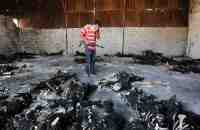
Some of Qaddafi's victims
Nice NYT analytic piece (already cited by Mark Thompson) by Helene Cooper and Steven Lee Myers regarding the downstream legacy of the US involvement in Libya to date. Starts off by saying the Obama White House seeks no doctrine definition because it fears being pulled into inappropriate situations, but, of course, that’s what a doctrine is supposed to do – delineate those cases. Bad doctrines tend to be too vague and open-ended (George W. Bush’s WRT terror), while better ones tend to be fairly specific (Jimmy Carter’s WRT the Persian Gulf).
Unsurprisingly, since Obama follows a rather open-ended one that stressed unilateralism – and primacy, his doctrine developments to date have been more about defining a floor than a ceiling. But as Cooper and Myers argue, we get a bit of both in the Libyan example:
During that [28 March] speech, Mr. Obama said that America had the responsibility to stop what he characterized as a looming genocide in the Libyan city of Benghazi (Principle 1). But at the same time, he said, when the safety of Americans is not directly threatened but where action can be justified — in the case of genocide, say — the United States will act only on the condition that it is not acting alone (Principle 2).
Floor definition is genocide, presumably among others, but ceiling definition is more comprehensive: absent a direct threat, we go only when others agree to go as well. Both notions are wonderfully sensible. Genocide makes for a more dangerous world, no question about it, but even there it’s a tricky definition. If we’re the only state that sees it, not a good sign. But if a decent collection are willing to go in and come to us for our specific Leviathan capabilities to complete the package? Well, as I’ve recently argued at Esquire (and in my books for years), that’s a good way to let the system “demand” for US security “exports” express itself (much better than pushing arms and hoping that works).
When you respond to “demand,” you’re doing the right thing, because you’re letting locals make the case and you’re letting globalization’s dynamics prioritize your responses (i.e., where the world’s connectivity to the situation makes it care enough about the outcome). In a fiscally constrained environment, that’s a smart way to husband your resources, using them when opportunities present themselves.
Again, from my perspective, we will see plenty of this in Africa in coming years and decades. Given its colonial past, a push-strategy won’t work well, especially with China’s ongoing “pull” economics arguably doing a ton of good for the continent (China is globalization’s prime integrating agent – get used to it). But as all that rising globalization connectivity creates both internal churn (change shakes things up, creating identity-based conflicts) and reformatting (fake states undergoing divorces like South Sudan’s recent move), while simultaneously making everyone outside of Africa more interested in its stability (a good thing, because a lack of interest enables a “failed state” to continue in its failure), we’ll need to figure out further what those other “floor” triggers are – meaning those situations where we’re actively asking other powers, “Do you think this is important enough to consider intervening?”
In the past, that conversation has often gone nowhere, and Africa has suffered an immense amount of civil strife. But as globalization makes everyone on this planet more interested in Africa’s stability, that will change. Obama’s doctrinal contributions to date are important in this regard. They negate the notion that Iraq + Afghanistan ended US interventions – a totally ahistoric notion anyway, and they’ve demonstrated that success can come in a variety of packages.


